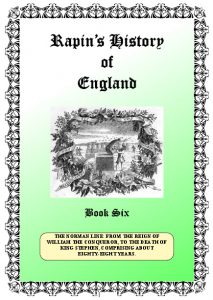WILLIAM I
SIRNAMED THE BASTARD, OR CONQUEROR
WILLIAM the Conqueror was two and forty years old at the time of the battle of Hastings, and had now been three and thirty years duke of Normandy. It will be necessary, therefore, before we enter upon his reign, to consider by what degrees Providence raised him to the throne of England, of which his birth seemed to give him no manner of prospect.
Normandy, one of the largest and most considerable provinces of France, was possessed by the Normans ever since the forced grant made by Charles the Simple to Rollo the Dane, the first duke. Rollo and his immediate successors, content with this noble acquisition, were less solicitous about enlarging their bounds, than securing the possession to their posterity. By means of numerous colonies of their own nation, who by reciprocal marriages were incorporated with the natives, they soon caused the two nations to become one people, under the common name of Normans; as the French called the foreigners lately settled in Neustria, which from them took also the name of Normandy. The first dukes made it their principal care to gain the affection of their subjects, by causing them to enjoy, as much as possible, the sweets of peace, and governing them with justice and equity. By this prudent conduct they not only destroyed the seeds of rebellion, which might lurk in the hearts of the ancient inhabitants; but also screened themselves from the secret practices of the kings of France, who grieved to see so noble a province torn from their monarchy.
From Rollo to William the Bastard there were seven dukes, among whom Richard II. who was the fourth, was one of the most illustrious. His first wife was Judith of Bretagne, by whom he had three sons, Richard, Robert, and William. After the death of Judith, he made a double alliance with Canute the Great, giving him his sister Emma, widow to Ethelred II. king of England, and taking himself Estrith sister to that prince. How honourable soever this match might be, his love of a young damsel called Pavia, caused him to divorce Estrith and marry his mistress. By this second wife he had William earl of Argues, and Manger archbishop of Rouen.
After the death of this prince, his son Richard III succeeded him, notwithstanding the endeavours of his younger brother Robert to supplant him. Robert, not being able to accomplish his designs, was forced to desist; or rather, as some affirm, went a surer and a more ready way to work. It is said, he procured his brother to be poisoned, who, after a reign of two years, left him the possession of the dukedom, he had so ardently wished for. Whether duke Robert’s crime was never fully proved, or his just government blotted out the remembrance of it, he found means to gain the affection of his people at home by his justice and liberality, whilst his valour made him respected abroad. By his aid, it was that Henry I. king of France, took possession of the throne,
